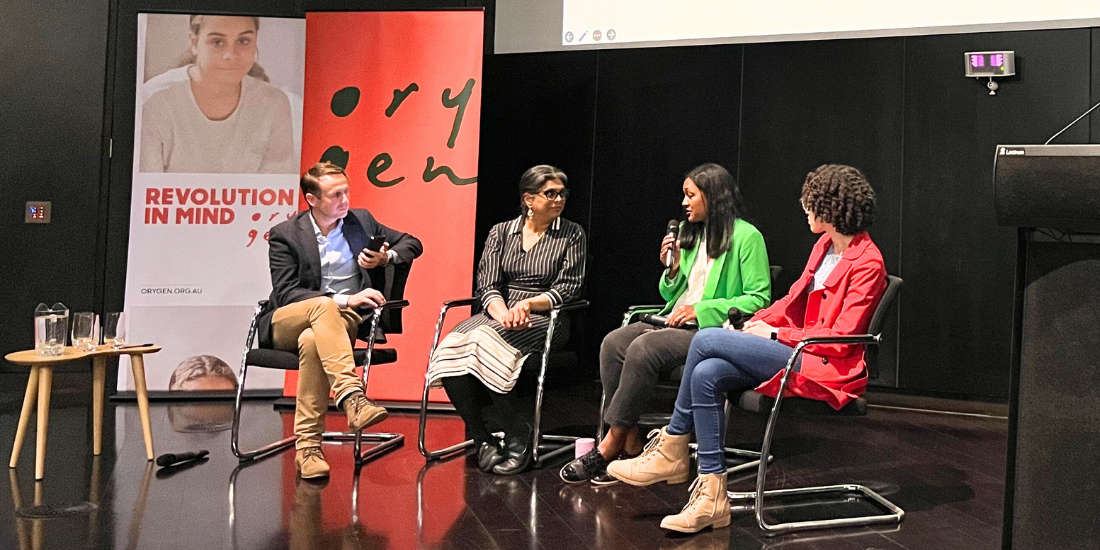 Professor Srividya Iyer (second from left), Dr Shaminka Mangelsdorf and Leila Heinrich with panel host, Matt Cram.
Professor Srividya Iyer (second from left), Dr Shaminka Mangelsdorf and Leila Heinrich with panel host, Matt Cram.
Listening to the voices of young people, valuing lived experience and transforming mental health services were at the centre of Orygen’s inaugural Youth Mental Health Symposium last week.
About 500 people from 15 countries attended the event, where Orygen brought together local and international experts to explore new approaches to tackling the youth mental health crisis.
- REPLAY: Scroll down to watch each of the three sessions
The day’s proceedings opened with a thought-provoking presentation from Shannon Pagdon, a PhD candidate from the University of Pittsburgh. Shannon reflected on her own experience as a young person diagnosed with psychosis, and the life-changing impact of peer workers in her recovery.
Shannon said that despite the vital role peer workers can play, she found a consistent lack of research in the field, especially in early psychosis. She is working to fill this gap and advocate for greater recognition and respect for peer work.
“I’ve heard from peer support specialists that it can feel like peer support has just been ‘slotted in’, without any intent to actually transform services to centre people’s lived experience,” she said.
“We have a problematic lack of lived experience in clinical leadership – and that’s why hiring peer support specialists, paying them properly and listening to their ideas is vital – and could transform mental health care services.”
These thoughts were echoed by Puneet Sansanwal from the Centre for Youth Mental Health Nursing, who explored how “consumer leadership can play a role in decision making” through four key pillars of co-production, ensuring people with mental ill-health and their supporters have genuine ownership over research into mental health.
The final speaker in the session, Explore Youth Researcher Michelle Lim, said “good research is research that is able to tell a story about the people involved”, also highlighting the need for more lived experience in research.
“Equipping young people with the skills required to participate in research is vital, recognising that they have the lived experience and diverse perspectives that can really make a difference to research outcomes.”
Click play to watch Session 1: Lived experience
Associate Professor Amanda Fitzgerald from University College Dublin opened the next session with a fascinating exploration of the drivers of youth mental ill-health in Ireland, presenting MyWorld survey data that painted a picture of declining youth mental health, similar to trends in Australia.
Again, respecting the complexity of young people’s lives and experience was foregrounded, with Associate Professor Fitzgerald exploring how “the social, economic and physical environment that people live in significantly impacts their mental health".
“We know lots of young people are affected by social inequalities – and we are increasingly talking about intersectionality and how different identities and backgrounds interact to impact mental health – and social determinant like where young people live and their financial situation play a major role,” she said.
“Importantly, social determinants are also the most modifiable set of targets for intervention to prevent mental health problems, and promote mental wellbeing in young people, so focusing on these issues has huge potential for positive change.”
Orygen researcher Dr Kate Filia followed with a presentation focusing on the how social inclusion, or exclusion, impacts on mental health, reiterating how important a young person’s context is, and how access to physical, emotional and financial resources is a vital but often overlooked factor in service design.
“We are working with Mission Australia to ask young people directly about their needs and experiences, and what their biggest challenges are,” Dr Filia said.
“We know young people want to be able to put their hands up and ask for help, but it’s really important that we have the right supports available to them when they do.”
Professor Nicola Reavley rounded out session two by highlighting that, “the focus shouldn’t be on the individual to ‘toughen up’” but should consider the supportive environments, such as schools, that shape and impact young people’s mental health.
Click play to watch Session 2: Social determinants
The final presentations looked at how these insights can be harnessed to revolutionise how we design and deliver services to young people.
Professor Srividya Iyer from McGill University, Montréal, discussed developments in systems of youth mental health care, including lived experience, shared decision-making and whole-of-person approaches.
When it comes to tackling youth mental ill-health, Professor Iyer said, “we need to bring the head and heart together, push ourselves to live up to our principles and go beyond rhetoric”.
“We need to reimagine the workforce, mental health interventions and services, and we must respect the diverse backgrounds and different cultures that shape and support young people around the world.”
Orygen Digital’s Dr Shaminka Mangelsdorf explored how digital interventions such as the highly successful MOST platform are plugging holes in Australia’s overloaded youth mental health system, and focused on finding the right balance between effective care and engaging delivery.
Returning to the value of peer work, the final presenter, Leila Heinrich shared reflections from those with lived experience, and articulated why involving peer workers in service delivery can transform young people’s experience of accessing care.
“A big part of being a peer support worker is walking alongside a young person and helping them navigate the system – a lot of people don’t know what it’s going to look like or have had bad experiences before – and we need to value that more,” she said.
The final panel explored the need for improved global conditions for young people and looked to a future of improved access, equity and quality of research and service delivery, with young people at its heart.
Click play to watch Session 3: Service delivery